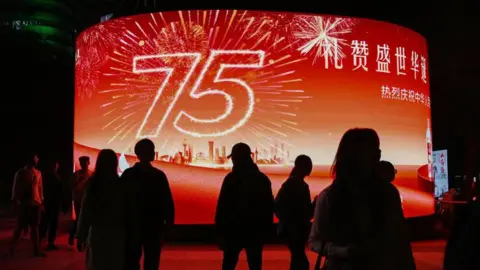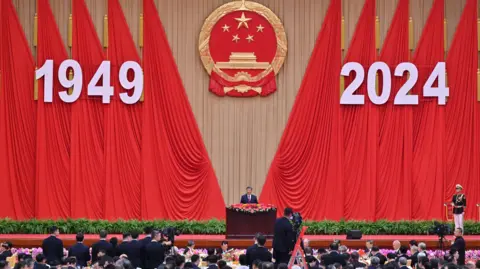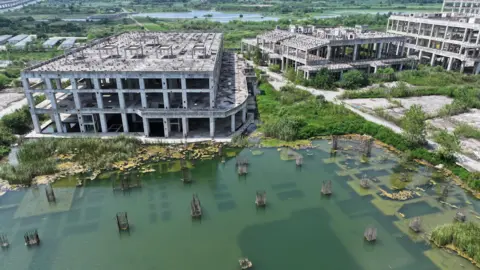
 Getty Images
Getty Images
The stimulus measures sparked a stock market rally but economists are unsure they can fix deeper issues
As China prepared to celebrate its Golden Week holiday and mark the 75th anniversary of the People’s Republic, the ruling Communist Party rolled out a raft of measures aimed at boosting its ailing economy.
The plans included help for the country's crisis-hit property industry, support for the stock market, cash handouts for the poor and more government spending.
Shares in mainland China and Hong Kong chalked up record gains after the announcements.
But economists warn the policies may not be enough to fix China's economic problems.
Some of the new measures announced by the People's Bank of China (PBOC) on 24 September took direct aim at the country's beaten-down stock market.
The new tools included funding worth 800bn yuan ($114bn; £85.6bn) that can be borrowed by insurers, brokers and asset managers to buy shares.
Governor, Pan Gongsheng, also said the central bank would offer support to listed companies that want to buy back their own shares and announced plans to lower borrowing costs, and allow banks to increase their lending.
Just two days after the PBOC's announcement, Xi Jinping chaired a surprise economy-focused meeting of the country's top leaders, known as the Politburo.
Officials promised to intensify government spending aimed to support the economy.
On Monday, the day before China headed off for a weeklong holiday, the benchmark Shanghai Composite Index jumped by more than 8%, in its best day since the 2008 global financial crisis. The move capped off a five-day rally that saw the index jump by 20%.
The following day, with markets closed on the mainland, the Hang Seng in Hong Kong rose by over 6%.
"Investors loved the announcements", China analyst, Bill Bishop said.
While investors may have been popping champagne corks, Mr Xi has deeper issues to tackle.

 Getty Images
Getty Images
President Xi Jinping has marked the 75th anniversary of the People's Republic of China
The People's Republic marking its 75th anniversary means it has been in existence longer than the only other major communist sate - the Soviet Union - which collapsed 74 years after its founding.
"Avoiding the fate of the Soviet Union has long been a key concern for China's leaders," said Alfred Wu, an associate professor at the Lee Kuan Yew School of Public Policy in Singapore.
At the forefront of officials' minds will be boosting confidence in the broader economy amid growing concerns that it may miss its own 5% annual growth target.
"In China targets must be met, by any means necessary," said Yuen Yuen Ang, professor of political economy at Johns Hopkins University.
"The leadership worries that failing to meet them in 2024 will worsen a downward spiral of slow growth and low confidence."
One of the main drags on the world's second-largest economy has been the downturn in the country's property market which began three years ago.
Aside from policies aimed at boosting stocks, the recently unveiled stimulus package also targeted the real estate industry.
It includes measures to increase bank lending, mortgage rate cuts and lower minimum down payments for second-home buyers.
But there's scepticism that such moves are enough to shore up the housing market.
"Those measures are welcome but unlikely to shift the needle much in isolation," said Harry Murphy Cruise, an economist at Moody's Analytics.
"China’s weakness stems from a crisis of confidence, not one of credit; firms and families don’t want to borrow, regardless of how cheap it is to do so."
At the Politburo session, leaders vowed to go beyond the interest rate cuts and tap government funds to boost economic growth.
However, beyond setting priorities like stabilising the property market, supporting consumption and boosting employment, the officials offered little in the way of details about the size and scope of government spending.
"Should the fiscal stimulus fall short of market expectations, investors could be disappointed," warned Qian Wang, chief economist for the Asia Pacific region at Vanguard.
"In addition, cyclical policy stimulus does not fix the structural problems," Ms Wang noted, hinting that without deeper reforms the problems China's economy face will not go away.
Economists see tackling entrenched problems in the real estate market as key to fixing the broader economy.
Property is the biggest investment most families will make and falling house prices have helped undermined consumer confidence.
"Ensuring the delivery of pre-sold but unfinished homes would be key," said a note from Sophie Altermatt, an economist with Julius Baer.
"In order to increase domestic consumption on a sustainable basis, fiscal support for household incomes needs to go beyond one-off transfers and rather come through improved pension and social security systems."

 Getty Images
Getty Images
Evergrande, which was one China's biggest property developers, went into liquidation in January
On the day of the 75th anniversary, an editorial in the state-controlled newspaper, People's Daily, struck an optimistic tone, recognising that "while the journey ahead remains challenging, the future is promising".
According to the article, concepts created by President Xi such as "high-quality development" and "new productive forces" are key to unlocking that path to a better future.
The emphasis on those ideas reflects Xi's push to switch from the fast drivers of growth in the past such as property and infrastructure investment, while trying to develop a more balanced economy based on high-end industries.
The challenge China faces, according to Ms Ang, is that the "old and the new economies are deeply intertwined; if the old economy falters too quickly, it will inevitably hinder the rise of the new".
"This is what the leadership has come to realise and is responding to."

 By BBC (Business) | Created at 2024-10-03 23:23:13 | Updated at 2024-10-04 01:29:44
2 hours ago
By BBC (Business) | Created at 2024-10-03 23:23:13 | Updated at 2024-10-04 01:29:44
2 hours ago


